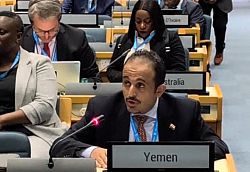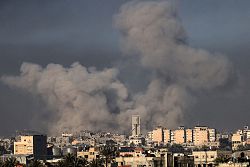
Yemen Calls for International Support to Rebuild Housing Sector
The Yemeni government has urged the international community to provide support to rebuild the country's housing sector, which has been severely damaged by the ongoing conflict.

Gaza Death Toll Rises to 54,381 Amid Ongoing Israeli Aggression
GAZA-SABA The death toll from the Israeli aggression on the Gaza Strip since October 2023 has risen to 54,381, with 124,054 injured, according to medical sources.

U.S. President plans to increase tariffs on steel, aluminum imports
U.S. President Donald Trump confirmed his intention to increase tariffs on foreign imports of steel and aluminum from 25% to 50%, which will increase pressure on steel producers worldwide and threaten to escalate his trade war.

Napoli Wins Serie A Title for Fourth Time
Napoli won the Serie A title for the fourth time in its history, after defeating Cagliari 2-0 in the 38th and final round of the competition.
Last Update: ،
2025/06/01
Time
12:27:19
Latest News:
 President al-Alimi meets with Arab Ambassadors to Russia
President al-Alimi meets with Arab Ambassadors to Russia
 Vice Foreign Minister receives copy of credentials of the Somali Ambassador
Vice Foreign Minister receives copy of credentials of the Somali Ambassador
 Leadership Council Chairman Warns of Iranian Expansion at Institute of Oriental Studies
Leadership Council Chairman Warns of Iranian Expansion at Institute of Oriental Studies
 Chairman of Leadership Council Honors Russian Scholar with Medal of Merit
Chairman of Leadership Council Honors Russian Scholar with Medal of Merit
 Ambassador Fakirah Meets with Jordanian Official to Discuss Bilateral Relations
Ambassador Fakirah Meets with Jordanian Official to Discuss Bilateral Relations
Latest News:
 President al-Alimi meets with Arab Ambassadors to Russia
President al-Alimi meets with Arab Ambassadors to Russia
 Vice Foreign Minister receives copy of credentials of the Somali Ambassador
Vice Foreign Minister receives copy of credentials of the Somali Ambassador
 Leadership Council Chairman Warns of Iranian Expansion at Institute of Oriental Studies
Leadership Council Chairman Warns of Iranian Expansion at Institute of Oriental Studies
 Chairman of Leadership Council Honors Russian Scholar with Medal of Merit
Chairman of Leadership Council Honors Russian Scholar with Medal of Merit
 Ambassador Fakirah Meets with Jordanian Official to Discuss Bilateral Relations
Ambassador Fakirah Meets with Jordanian Official to Discuss Bilateral Relations
Taiz hosts workshop to enhance development solutions for displaced persons
[23/09/2024 05:59]
Taiz - Saba
An introductory workshop was held Monday here for the project on development solutions based on displacement areas, organized by the United Nations in partnership with the Yemeni government.
The workshop aims to create a shared understanding of the main principles for internally displaced persons (IDPs) solutions.
Taiz Governor Nabil Shamsan emphasized during the workshop—attended by district directors and executive office heads—that Taiz is the largest governorate receiving displaced persons from all provinces, particularly from areas under Houthi control.
He pointed out the importance of the workshop in discussing the humanitarian situation and the challenges faced by local authorities in accommodating IDPs and meeting their basic needs, stressing the need to develop a matrix of solutions that represents a shared vision and a future action plan to overcome these challenges.
"Taiz hospitals receive daily many more patients than before the opening of the eastern passage, which increases the pressure on health services," he said.
He underscored the importance of cooperation between local authorities and humanitarian partners to meet as many needs as possible, calling on international and UN organizations to provide more support and sustainable development projects that help displaced persons achieve stability and alleviate the burden of difficult economic conditions.
Shamsan noted that transitioning from emergency humanitarian aid to sustainable humanitarian assistance is the best approach for achieving real development at the individual and family levels.
He highlighted the importance of the economic development plan for Taiz and the support from international organizations, mentioning that this transition will contribute to improving economic and social conditions in the governorate.
For his part, Ahmed Torbush, advisor for durable solutions at the UN Resident Coordinator’s Office, noted that the project is funded by the Internal Displacement Solutions Fund and aims to enhance national and local capacities to implement the national policy for internally displaced persons in Yemen for the year 2013.
He reaffirmed the UN's commitment to strengthening cooperation at all levels and developing a comprehensive roadmap for the national policy on internal displacement.
Abdu al-Muhathab, the Representative of the Executive Unit for IDPs at the main office in Aden, spoke about the government's commitment to assuming responsibility towards displaced persons and communities affected by displacement, working towards safe, voluntary, and durable solutions through a comprehensive approach that addresses displacement in three phases simultaneously.
Ali Al-Shamiri, the Director of the Executive Unit for IDPs in Taiz, explained that the workshop aims to develop a permanent and comprehensive plan reflecting the community's needs, calling on all participants to actively engage in discussions and exchange ideas, stressing that cooperation is key to achieving success in this project.
An introductory workshop was held Monday here for the project on development solutions based on displacement areas, organized by the United Nations in partnership with the Yemeni government.
The workshop aims to create a shared understanding of the main principles for internally displaced persons (IDPs) solutions.
Taiz Governor Nabil Shamsan emphasized during the workshop—attended by district directors and executive office heads—that Taiz is the largest governorate receiving displaced persons from all provinces, particularly from areas under Houthi control.
He pointed out the importance of the workshop in discussing the humanitarian situation and the challenges faced by local authorities in accommodating IDPs and meeting their basic needs, stressing the need to develop a matrix of solutions that represents a shared vision and a future action plan to overcome these challenges.
"Taiz hospitals receive daily many more patients than before the opening of the eastern passage, which increases the pressure on health services," he said.
He underscored the importance of cooperation between local authorities and humanitarian partners to meet as many needs as possible, calling on international and UN organizations to provide more support and sustainable development projects that help displaced persons achieve stability and alleviate the burden of difficult economic conditions.
Shamsan noted that transitioning from emergency humanitarian aid to sustainable humanitarian assistance is the best approach for achieving real development at the individual and family levels.
He highlighted the importance of the economic development plan for Taiz and the support from international organizations, mentioning that this transition will contribute to improving economic and social conditions in the governorate.
For his part, Ahmed Torbush, advisor for durable solutions at the UN Resident Coordinator’s Office, noted that the project is funded by the Internal Displacement Solutions Fund and aims to enhance national and local capacities to implement the national policy for internally displaced persons in Yemen for the year 2013.
He reaffirmed the UN's commitment to strengthening cooperation at all levels and developing a comprehensive roadmap for the national policy on internal displacement.
Abdu al-Muhathab, the Representative of the Executive Unit for IDPs at the main office in Aden, spoke about the government's commitment to assuming responsibility towards displaced persons and communities affected by displacement, working towards safe, voluntary, and durable solutions through a comprehensive approach that addresses displacement in three phases simultaneously.
Ali Al-Shamiri, the Director of the Executive Unit for IDPs in Taiz, explained that the workshop aims to develop a permanent and comprehensive plan reflecting the community's needs, calling on all participants to actively engage in discussions and exchange ideas, stressing that cooperation is key to achieving success in this project.
Key words:
workshop—attended - Coordinator’s - Representative - simultaneously - responsibility - organizations - comprehensive - transitioning - understanding - international - President al-Alimi meets with Arab Ambassadors to Russia
President al-Alimi meets with Arab Ambassadors to Russia Vice Foreign Minister receives copy of credentials of the Somali Ambassador
Vice Foreign Minister receives copy of credentials of the Somali Ambassador Leadership Council Chairman Warns of Iranian Expansion at Institute of Oriental Studies
Leadership Council Chairman Warns of Iranian Expansion at Institute of Oriental Studies Chairman of Leadership Council Honors Russian Scholar with Medal of Merit
Chairman of Leadership Council Honors Russian Scholar with Medal of Merit Ambassador Fakirah Meets with Jordanian Official to Discuss Bilateral Relations
Ambassador Fakirah Meets with Jordanian Official to Discuss Bilateral Relations Presidential Council Chairman Holds Bilateral Talks with Russian President Vladimir Putin
Presidential Council Chairman Holds Bilateral Talks with Russian President Vladimir Putin President al-Alimi lays a wreath at the grave of the unknown Russian soldier
President al-Alimi lays a wreath at the grave of the unknown Russian soldier President al-Alimi Meets with the Chairman of the Russian State Duma
President al-Alimi Meets with the Chairman of the Russian State Duma Presidential Leadership Council Chairman Arrives in Moscow for High-Level Talks
Presidential Leadership Council Chairman Arrives in Moscow for High-Level Talks Yemeni Interior Minister Highlights Significance of National Unity
Yemeni Interior Minister Highlights Significance of National Unity


